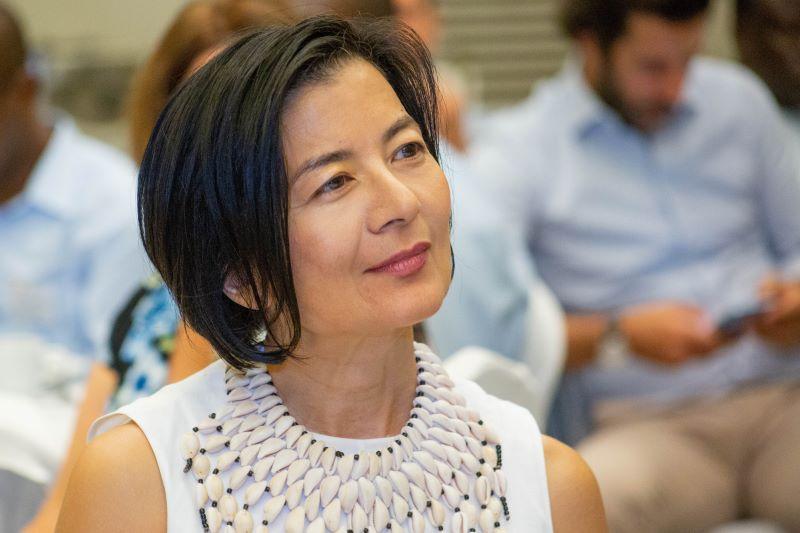-

Hear from Professor Monica Toft
Learn how Professor Monica Toft is shaping the study of global affairs and diplomacy at Fletcher.
Hear from Prof. Toft -

Explore Fletcher academics in action
Fletcher Features offers insights, innovation, stories and expertise by scholars.
Get global insights -
Get application tips right from the source
Learn tips, tricks, and behind-the-scenes insights on applying to Fletcher from our admissions counselors.
Hear from Admissions -

Research that the world is talking about
Stay up to date on the latest research, innovation, and thought leadership from our newsroom.
Stay informed -
Meet Fletcherites and their stories
Get to know our vibrant community through news stories highlighting faculty, students, and alumni.
Meet Fletcherites -

Forge your future after Fletcher
Watch to see how Fletcher prepares global thinkers for success across industries.
See the impact -

Global insights and expertise, on demand.
Need a global affairs expert for a timely and insightful take? Fletcher faculty are available for media inquiries.
Get in Touch
To Resolve the Unresolvable
President and CEO of the Mastercard Foundation Reeta Roy F89 finds creative solutions to global problems

Reeta Roy F89 has a gift for reimagining boundaries. As president and CEO of the Mastercard Foundation, one of the largest international nongovernmental organizations with assets of $42 billion, she takes a bold approach to development and works closely with philanthropic partners throughout Africa and in Canada.
A compassionate leader and gifted connector, Roy convenes development partners from diverse sectors of Africa’s economies and unites them all behind shared impact, with the goal of improving the lives of young people.
A Bold Response to Global Challenges
Roy grew up in Malaysia. After her father passed away, her mother sent her to a high school in North Carolina, where Roy's older brother was attending college. After high school, Roy went to St. Andrew’s University in Laurinburg, N.C. There, she met with a trusted professor who pointed her to The Fletcher School, and she was energized by the school’s international community.
“Being with people from all over the world, whose life experience grounded them in a different point of view, shaped my comfort with ambiguity,” she said, “the ability to say, ‘I don't know, I may have a sense of the destination, but I'm not yet sure about the path.’”
“Part of getting there means engaging with others, being willing to listen, to solicit views,” Roy added. “In some cases, it requires challenging and disagreeing to get a better outcome. That's something which has held up even in my work today.”
This open-minded approach to problem-solving proved essential in response to the COVID-19 pandemic. In 2021, the Mastercard Foundation partnered with the Africa Centres for Disease Control and Prevention to launch Saving Lives and Livelihoods, a $1.5 billion initiative to purchase vaccines and roll them out to millions of people. The program ensures Africa’s long-term health security by building the workforce for vaccine manufacturing on the continent.
After just two years, more than 50 percent of the population had been vaccinated. At the beginning of the pandemic, only two laboratories in Africa could perform genomic sequencing. Today, over 30 laboratories have this capability. Longer term, this initiative will strengthen vaccine manufacturing capacity in Africa, and reduce the continent’s reliance on overseas production.
Thoughtful leadership and a comprehensive approach to philanthropy are hallmarks of Roy’s career. Under her leadership, the foundation has partnered with African organizations, which are embedded in their communities and therefore able to scale their reach and impact. Many have evolved and expanded to meet the needs of their customers and communities.
“Financial service providers have adapted to offer more affordable financial services to people who were previously unbanked,” said Roy. “Innovators in education have redefined what it means to provide wide access to secondary and tertiary education using technology.”
She is particularly proud of the Mastercard Foundation Scholars Program, which prepares young people to succeed and lead in a complex world. Thus far, the program has educated 45,000 young people through a network of 40 educational partners. “One of our graduates is the youngest member of the Cabinet in Rwanda, where I live. We now have hundreds of these kinds of stories, and we’re going to go for 100,000 young transformative leaders.”
Value-based Leadership in Action
From the early stages of her career to her current role, Roy has drawn inspiration from her time at Fletcher.
“In many ways, Fletcher represents a set of values,” she said.
For Roy, these values include optimism, community, adventurousness, embracing diversity, and singularity of purpose. “The world is a complex place and is moving into a future that is rife with conflict, climate change, and economic dislocation. It takes courageous and optimistic people to find ways to resolve what is seemingly unresolvable and to move things forward.”
She is grateful to Fletcher for orienting her to solve problems by exposing her to new ideas and navigating complexity.
“The answers to questions are not always black and white,” Roy said. “They're not binary choices. You’ve got to get comfortable with the gray, and you’ve got to be imaginative with figuring out other solutions, in some cases breaking away from the conventional path.”
Read more about Fletcher’s human security and humanitarian affairs field of study.

